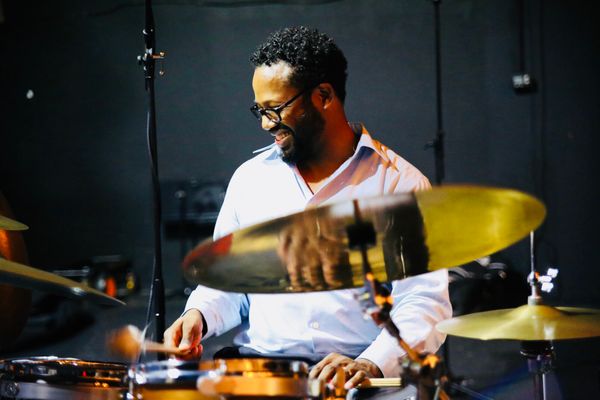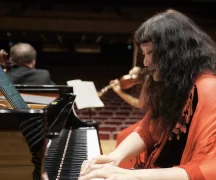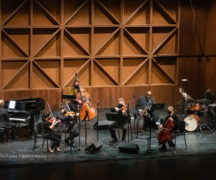By DAVID DUPONT
BG Independent News
Mark Lomax II was born immersed in the music of his people.
By the time he was six months he was matching pitches with the voices from the gospel choir his mother led.
By age 2, he was playing the drums, and several years later was backing up gospel choirs.
By 12, he was a professional musician, accompanying gospel groups.
It was about this time that he discovered jazz and the new freedom it brought to his playing.
He went to earn two degrees in music from Ohio State.
Lomax’s precocious talents blossomed within a family and a community dedicated to the propagation and development of African and African American culture.
Lomax will share that knowledge at Bowling Green State University during a two-day residency Tuesday and Wednesday, culminating in a performance Wednesday at 7 p.m.in Kobacker Hall.
At the performance, presented under the auspices of the Hansen Musical Arts Series, Lomax will present a 60-minute suite of music from his mammoth undertaking “400: An Afrikan Epic,” a 12-disc set of music that travels from the sounds of Africa into a vision of Afro-futurism.
The music will be performed by Lomax’s jazz quartet from Columbus and a BGSU string quartet. The concert is free but tickets are required. Click here for tickets.
Lomax said the mixing genres is part of his message. With broad experience in gospel, jazz, and orchestral music, he was told that he had to focus on one genre.
“I loved all the music,” he said in a recent telephone interview. “I always sought to create an organic hybrid, a musical expression that absolutely requires both.”
In this instance he blends the string quartet from European classic tradition and the improvised music tradition from jazz and the blues. “In a racialized context, we’re taught the two can’t get along because the two are strictly opposed, music suggests otherwise,” he said.
In 2016 he was considering the 400th remembrance “of the first enslaved African ancestors forcibly brought to America … in the way we understand slavery.” Africans had already enslaved for 150 years in the Caribbean and South America, he said. But these enslaved Africans arrived in Port Comfort, Virginia.
And 2019 was also Lomax’s 40th birthday. He was born in Blacksburg, Virginia to pastor and scholar Mark Lomax and musician and educator Cynthia Gowens, who incidentally has undergraduate and graduate degrees from BGSU.
“There was all this synergy happening.”
He sat down to write a symphony in three movements, tracing the arrival of those “20 or so Negroes, as described in the historical record, from Angola,” to a more hopeful future informed by the African concept of Ubunto: “I am because you are.”
As he was sketching out the symphony, he realized this had a much larger scope, that it would take a dozen albums to cover the intellectual and musical territory he envisioned.
“Not being the most sane person,” he quipped, he set about achieving his goal, in the words of Malcolm X, “by any means necessary.”
The 12-disc set was released on time, though the global pandemic stymied his plans to tour and promote it.
The BGSU performance will relaunch those efforts.
“It really is created for everyone to have the context, the history, of why we are where we are today in this historical, social, political discourse, so we can figure out together how to go forward,” Lomax said.
The influences, drawn from “warrior scholars” and innovative musicians who brought together classical composition and the beats of funk, blues and jazz to gospel, all came from close to home. The books were on his father’s book shelves. The sounds emanated from the choirs his mother directed or performed in and from the cassettes his parents brought home with them from their many trips to Africa.
“400: An Afrikan Epic” opens by establishing “the drum as voice of the people.” It “speaks about the spiritual practice and historical identity” of Africans.
The middle section deals with Maafa, the era from 1619 to the present, “the time in our history when we have been at our lowest.”
During this period “the West is the political dynamo and Africa is still being raped of its resources and its people are in turmoil, even though things are a little better,” Lomax said. “All of this is upside down compared to before colonization and European imperialism.”
This middle section has a ballet set on a slave ship. It also includes character sketches, Lomax said, of inspirational African and African American women and a tribute to the storytelling of the playwright August Wilson “who captured African American culture in a way nobody had before him.”
Then in “palindromic fashion” the last third returns to Africa.
“The final section is where the magic happens,” he said. Here he envisions a future shaped by African social and cultural values. “What happens if Africans in America can return to our traditional notions of being? What happens when we see ourselves as one people as opposed to the way we’ve been taught in the Western context, divided based on class, based on color of our skin, and all these other things.”
“Ubunto … means my humanity is dependent on your humanity. It doesn’t matter if you’re purple, white or blue, rich or poor, male or female, your humanity is a reflection of my humanity”
This, he said, is a universal concept. “What it takes to heal a people who have gone through slavery, gone through Jim Crow, who have gone through and gone through and gone through, and continue to go through with police brutality, mass incarceration, racial wealth gaps and all these kind of things, is what it takes to heal all humanity and figure out a way to create a global society … that works for all of us.”
That’s a lot to fit into eight and half hours of music, and more daunting in an hour-long set. “I took the major themes from ‘400,” and the themes run across all 12 albums, and I recomposed them so they tell a seamless story in micro,” Lomax said.
That smaller scale form still communicates a sweeping musical vision that’s at once contemporary and resonates with echoes from an ancient time.





